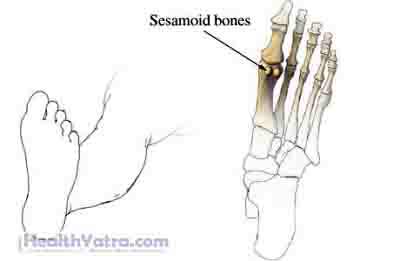Definition
A sesamoid is a type of bone that is found within a tendon. Sesamoid fractures most commonly refer to the bones located under the big toe. These small bones allow smooth movement of the feet. These are the least common fractures of the forefoot.

Causes
Sesamoid fractures can be caused by:
- Injuries, particularly:
- Falling from a height and landing heavily on the feet
- Crush injury
- Repetitive stress to the bone
- Hyperextension of the toe and forefoot
Risk Factors
These factors increase your chance of a sesamoid fracture. Tell your doctor if you have any of these risk factors:
- Participation in high-impact sports
- Running
- Aerobics
- Ballet
- Basketball
- Gymnastics
Symptoms
The most common symptom of a sesamoid fracture is pain in the ball of the foot and big toe. Other symptoms include:
- Swelling to foot and big toe
- Bruising
- Tenderness to touch
- Limited range of motion to the big toe
Diagnosis
Your doctor will ask about your symptoms and medical history. A physical exam will be done. Your doctor may refer you to a specialist. A podiatrist focuses on the feet. An orthopedist focuses on bones.
Tests may include the following:
- X-ray of the foot—test that uses radiation to take a picture; used to detect breaks in the bone
An x-ray may not be able to provide enough detail of the small bone. In this case you may need:
- Bone scan of the foot—test that determines mineralization of bone
- A CT scan or MRI scan are sometimes needed
Treatment
Sesamoid fractures are most often treated with rest and rehabilitation. Talk with your doctor about the best plan for you. Treatment options include the following:
Immobilization
The foot is immobilized with a cast. This will promote healing and keep weight off the foot. Crutches are also used to limit weight bearing on the affected foot.
Medications
Nonsteroidal anti-inflammatory drugs (NSAIDs) are given to reduce pain and swelling. A cortisone shot may also be used to treat the pain and inflammation.
Physical Therapy
Once the cast is removed, physical therapy may be advised. A therapist will work with you to strengthen your muscles and improve your range of motion. You may be given an orthotic device or insert to wear in your shoe. This can protect your foot from future injury.
Surgery
Surgery is rarely needed. However, if the pain does not resolve, the sesamoid bone is sometimes removed. This is called a sesamoidectomy.
Prevention
To help reduce your chance of fracturing your sesamoid bone:
- Practice good nutrition for bone health including adequate amounts of calcium andvitamin D
- Wear the proper footwear for the activity
